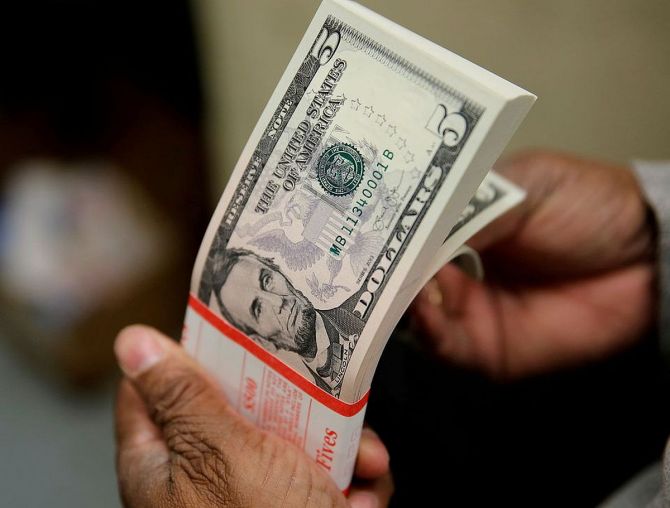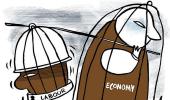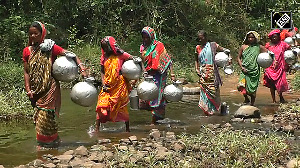The World Bank has approved loans totalling $1.75 billion (about Rs 13,834.54 crore) to fund India's PM Ayushman Bharat scheme and private investment to boost the economic growth.

Of the total loan, $1 billion will go towards the health sector, while the rest $750 million will be in the form of development policy loan (DPL) to fill the financing gaps through private sector investment in the economy.
The World Bank Board of Executive Directors approved two complementary loans of $500 million each to support and enhance India's health sector.
Through this combined financing of $1 billion, the World Bank will support India's flagship Pradhan Mantri-Ayushman Bharat Health Infrastructure Mission (PM-ABHIM), launched in October 2021, the World Bank said in a release on Friday.
The funds will be used to improve public healthcare infrastructure across the country.
In addition to the national-level interventions, one of the loans will prioritize seven states namely Andhra Pradesh, Kerala, Meghalaya, Odisha, Punjab, Tamil Nadu, and Uttar Pradesh, the multi-lateral funding agency said.
Separately, its board approved the DPL to the union government to support reforms critical to addressing financing gaps by leveraging private sector investment in infrastructure, small businesses, and the green finance markets.
The World Bank said India's performance in the health sector has improved over time.
It has estimated India's life expectancy at 69.8 in 2020, up from 58 in 1990 -- higher than the average for the country's income level.
The under-five mortality rate (36 per 1,000 live births), infant mortality rate (30 per 1,000 live births), and maternal mortality ratio (103 per 1,00,000 live births) are all close to the average for India's income level, reflecting significant achievements in access to skilled birth attendance, immunizations, and other priority services, the World Bank said.
It said despite these advances in the health sector, COVID-19 has underscored the need for revitalising, reforming, and developing capacity for core public health functions, as well as for improving the quality and comprehensiveness of the health service delivery.
"The COVID-19 outbreak has re-emphasized the urgency for significant reforms to improve the health sector performance in India," said Hideki Mori, World Bank's Acting Country Director for India.
Mori said India's decision to invest early and significantly to strengthen its health system even as it emerges from the pandemic, is a pioneering choice and "we are pleased to support this important agenda."
Under health, two loans-- Public Health Systems for Pandemic Preparedness Programme (PHSPP) and Enhanced Health Service Delivery Programme (EHSDP) -- are designed to be complementary and transformational in impact.
It will support the Indian government's reform agenda to accelerate universal coverage, improve quality, and increase the resilience and preparedness of the health system, the World Bank said.
PHSPP will support the government's efforts to prepare India's surveillance system to detect and report epidemics of potential international concerns; enhancing capacity to detect pathogens, including zoonotic diseases and strengthen coordination and build institutional capacity of core public health institutions.
EHSDP will support the government's efforts to strengthen service delivery through a redesigned primary health care model; improve quality of care by supporting the National Quality Assurance Standards certification across Health and Wellness Centres (HWCs); and transform the health sector governance and accountability by strengthening implementation capacity.
About the DPL, the World Bank said the Indian government has taken several measures over the past decade to improve financial inclusion as well as the stability of the financial sector and the domestic capital markets.
This has resulted in a more efficient and resilient sector in the face of the COVID-19 crisis and other external shocks.
Despite this progress, pressure on public resources and financing needs for key sectors of the economy remain high. For infrastructure and micro, small and medium enterprises (MSMEs), the annual finance gap is estimated at 4 per cent of GDP and between Rs 18–25 lakh crore, respectively.
In addition, the World Bank estimates show that the energy transition required to meet the government's COP26 commitments will require an annual cumulative investment of 1.5 per cent of GDP.
"An efficient financial system capable of meeting the country's investment needs is key to support India's rebound from the pandemic and to realise its ambitious sustainable growth targets," Mori said.
This operation aims to reduce the pressure on public finances by leveraging private resources to support the country's development goals, the official said.
Of the $750 million commitment, $667 million will be a loan from the International Bank for Reconstruction and Development and $83 million will be financed by a credit from the International Development Association (IDA), the World Bank's concessionary lending arm.












 © 2025
© 2025